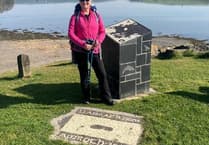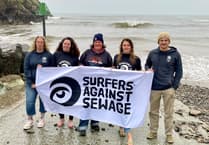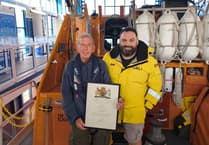Turning on the gas? We have been warned that plans are underway to remove vehicles giving out petrol and diesel emissions with the introduction of all electric vehicles. Now I learn that one of the major machinery manufactures in Eastern Europe is turning to gas power.
Could this be the future on Welsh farms?
Gomselmash - a major manufacturer of combine and forage harvesters from Belarus -is testing the first large-scale combine harvester in the world to run on compressed natural gas.
The prototype machine -dubbed the Palesse GS4118K - made its inaugural run in July, having been fuelled up by Gazprom Transgas Belarus.
The combine harvester is equipped with a ‘gas’ engine, along with gas storage cylinders, low and high-pressure lines, valves and associated plumbing and circuitry.
If the trials prove to be a success, Gomselmash says that this new breed of machines could make grain harvesting ‘more economical and environmentally friendly.’
According to the manufacturer, so-called experts say that the use of methane instead of diesel fuel could ‘reduce fuel costs by 40 per cent, as well as reduce the amount of harmful emissions.’
Interestingly, Gomselmash has also been field-testing its conventional combines in Iran - of all places. A Palesse GS575 and a Palesse GS812 were both transported to the country, where they are tackling wheat and rape.
The tests are required before the harvesters can be certified in Iran and before they can be included on the register of agricultural machinery authorised for sale there.
Who or what is Gomselmash?
It has is headquartered in the Republic of Belarus and a legacy stretching back over eight decades. The entity now claims to have produced in excess of 2,500,000 agricultural machines, including sizeable numbers of forage harvesters in particular.
The company now exports over 90 per cent of its production; that figure has grown rapidly from just over 72 per cent in 2012.
Many of Gomselmash’s harvesters are marketed under the ‘Palesse’ product name; it encompasses grain and forage equipment - as well as even potato harvesters.
In fact, the range includes 16 different equipment lines, stretching out to over 75 different models.
Keeping an eye on the ball
One of the constant roles of the NFU is to carefully and continually monitor incorrect and misleading statements reported on TV, radio and in the press.
The ‘Guardian’ - who else, claiming an ‘exclusive’ in ‘investigative journalism’ recently reported that the US model of intensive farming is invading the world and that the UK now has nearly 800 livestock mega farms.
The report goes on: ‘Demand for cheaper food and lower production costs is turning green fields into industrial sheds to process vast amounts of meat and poultry
‘Since the days of the wild west frontier, the popular image of American farming has been of cowboys rounding up steers on wide open ranches, to whoops, whips and hollers. Today, the cowboys on their ranches under wide open skies have been replaced by vast sheds, hulking over the plains, housing tens of thousands of animals each, with the noises and smells spreading far beyond their fences....
.....Ranching was never an option in the UK, but most people still expect farms to consist of green fields rather than vast industrial-scale sheds. The reality is an increasing number of livestock are ‘zero graze,’ spending all or almost all of their time indoors.’
NFU deputy president, Minette Batters, replied in the following vein: “The picture painted in the story would be completely unrecognisable to most British farmers. While the farming sector is evolving to meet a growing demand for food, it is also the case that the number of farms has decreased in the past few years.
“What hasn’t changed is the high quality, safe, traceable and affordable food being produced by British farmers to exacting welfare and environmental standards.
“The key thing for any livestock farmer is the health and welfare of their animals and, as veterinarians and the farmers themselves can testify, farm size is not a measure for the welfare of an animal. What does impact on animal welfare is the quality of management and stockmanship that farms operate to.
“UK farmers are leaders in good husbandry and high animal welfare and environmental standards which are grounded in robust science and innovative technology - all of which plays a major role in balancing the need to produce more British food in a way that is sustainable environmentally, economically and socially.”
Not so funny
A former student related this funny story in the pub: Well, perhaps it seems funny now, but it certainly wasn’t when it happened!
“Back in 1991, I owned a fantastic and unbelievable Lada Niva, a 4x4 car not very known in the States or in India whilst very popular in Europe by that time.
“One Saturday night I took my then girlfriend for a ‘special’ night at the shore of the River Adaja, which is the river that crosses my city.
“All was fine and when we had been nicely parked up for some time I started my car on, insert reverse, began moving backwards... and we fell off in the river. As it was very dark, we didn’t realise that we were very close to the bank, and as a result, we had half the car in the river and only the engine and front seats remained out of the water. Fortunately, the car stopped before sinking down.
“I tried to get the car out to no avail. No other option than to get out of the car by ourselves and tow her out when we found a rescue van.
“Just after getting the doors open, I smelt a strange aroma, and also noted that the water was not cold at all. Better said, it was more or less warm instead. And the touch of the riverbed with my feet was... oh, my God!
“Our clothes, apart from wet, were black and the smell was terrible, a mixture of something rotten and, well... **** everywhere - I did see some familiar objects floating around me!
“Yes, we fell off just where the main sewer spewed the sewage of a 40,000 city inhabitants into the river. The new purifier station was not even built by that time and the old one was unable to fully cope with the mess.
“The driver of the rescue van said to me that better not to ask how the hell I managed to get the car where it was. In order to attach the hook, I had to get into the ‘water.’ Again. Oh, damn!
After getting home, I took the longest shower in my life. All my body down my chest was covered in black sludge, I used all kinds of soap, shampoo, sponges, scourers...It took ages until my skin became white again. My clothes of course went directly to the trashing bin. Finished my cleaning with litres of alcohol, just in case.
Next day, we washed the car, with overalls, caps and masks. It took us three hours until the trunk and rear seats were ‘acceptable’ again, whilst the smell inside never left the car until I got rid of her, three years after. In the trunk, we found everything. Everything means things that I do not even want to remember. Even new dead species unknown for the science, and I think it’s better for all of us to remain unknown.
“Nowadays the river is clean and even ducks and geese gather and swarm over there, but 23 years back it was just a dangerous mix of filth, muck and rubbish.
“Yes, it’s funny now, but I get the shivers even today when I remember that night.”
An Irish family tradition
Patrick had long heard the stories of an amazing family tradition. It seems that his father, grandfather and great-grandfather had all been able to walk on water on their 18th birthday. On that special day, they’d each walked across the lake to the pub on the far side for their first legal drink.
So, when Patrick’s 18th birthday came round, he and his pal Tony, took a boat out to the middle of the lake, Patrick, stepped out of the boat ...and nearly drowned! Tony just barely managed to pull him to safety.
Furious and confused, Patrick, went to see his grandmother. “Grandma,” he asked. “It’s my 18th birthday, so why can’t I walk cross the lake like my father, his father, and his father before him?”
Granny looked deeply into Patrick’s, troubled brown eyes and said: “Because your father, your grandfather and your great-grandfather were all born in December, when the lake is frozen, and you were born in August, you big dip.”





Comments
This article has no comments yet. Be the first to leave a comment.